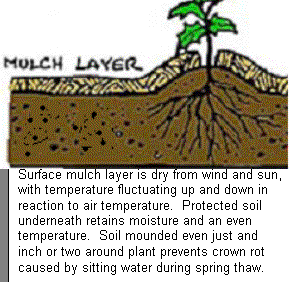Mulch.
Except for deserts, healthy eco-systems have a heavy layer of ground cover otherwise known as mulch. In Permaculture, we want to utilize the patterns found in nature for use in food production, so we use mulch.
You should pull most weeds before you cover with mulch because existing weeds might have the energy to "pop" through. Mulch is cheap and easy to find. In fall, people throw away tons of leaves; these leaves are excellent mulch (avoid oak and walnut leaves because they suppress growth). Ask people if you can take their leaves; most would welcome it greatly. Straw bales are used as Fall/Halloween displays and are usually thrown out or given away, ask for these at the end of the season as well. Black and white newspaper can also be used. Avoid bales of hay since they have many seeds.
Most "weeds" only have enough energy to grow a couple inches, if they cannot find light fairly quickly they will die. To plant things that you want, just make a hole through the mulch to the ground.
Mulch has other important benefits in nature as well as your garden. It absorbs moisture and prevents evaporation at the ground level. I was able to not water my garden for a week at a time. After a week the ground was still very wet. This was in the 100 degree heat of desert summer.
Eventually mulch decomposes and turns into humus (essentially compost). Humus is a nutrient dense, extremely absorbent material, that has reached maximum decay. Humus is one of the best amendments to the soil, and is the major ingredient in the most healthy and fertile of soil.
Mulch not only adds to the quality of soil but also maintains the quality by preventing wind and water erosion of top soil. In some areas it can take a thousand years to create one inch of topsoil.
Rocks can also be used as mulch. In extremely hot regions, white rock is used to reflect the sun's heat and prevent water evaporation. In cold regions, black rock is used to absorb heat and warm the otherwise cold soil.
Happy Mulching!
Growing your own food is an important part of Thrivalism.
 |
| Image Source: gardenpossiblities.com |
No comments:
Post a Comment